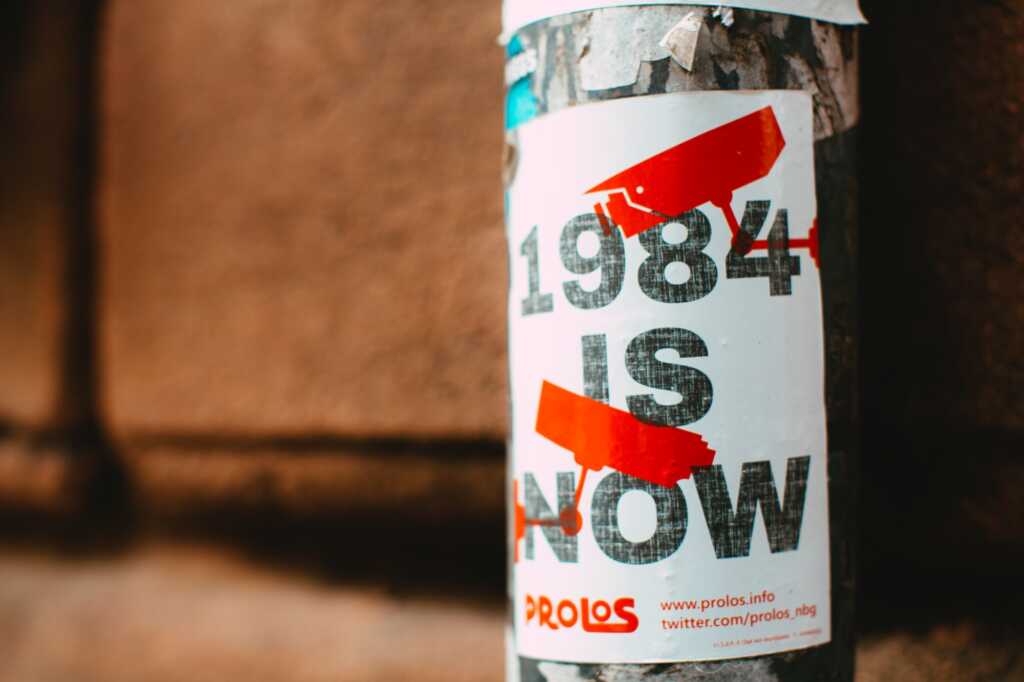We’re living through an era in which novelist George Orwell’s book “1984” seems less like fiction and more like a blueprint of what’s to come.
In fact, right now, the classic novel, written in 1949, is the No. 2 best-selling book on Amazon, a platform that, earlier this week, essentially removed the conservative social media site Parler from the internet because the company disagrees with the way the Twitter alternative polices its content.
The setting of Orwell’s dystopian story is “Airstrip One,” formerly known as Great Britain, a province of the bloated and powerful superstate “Oceania.” Those who live there, according to the Audible summary of the book, are victims of perpetual war, unending and inescapable government surveillance, as well as the impenetrable manipulation of information.
Oceania’s political ideology, euphemistically named “English Socialism” (shortened to “Ingsoc” in “Newspeak,” the government’s invented language that will replace English or “Oldspeak”), is enforced by the privileged, elite “Inner Party.”
Via the “Thought Police,” the “Inner Party” persecutes individualism and independent thinking, which are regarded as “thoughtcrimes.” The tyranny is ostensibly overseen by a mysterious leader known as “Big Brother,” who enjoys an intense cult of personality. The Party “seeks power entirely for its own sake. It is not interested in the good of others; it is interested solely in power.”
The book’s protagonist, Winston Smith, a member of the “Outer Party” and an official with the ironically named “Ministry of Truth,” which wields control over the flow of information, is tasked with rewriting newspaper stories so the narrative always matches up with the leading Party’s agenda. Workers are led to believe they’re correcting misquotes. In reality, however, they are replacing fact with fiction presented as valid information.
There’s also the “Ministry of Peace,” which keeps Oceania in a constant state of war, as well as the “Ministry of Plenty,” which rations food to all citizens. In addition, the government uses its pre-approved language, “Newspeak,” to limit the vocabulary used by the people.
It’s no wonder “1984” is flying off the shelves. I have a copy of my own sitting on the bookshelf behind me.
In less than a week of time, Twitter has permanently banned President Donald Trump from its platform, Facebook has “indefinitely” suspended the Republican leader’s ability to post to his account, Amazon’s web hosting service has virtually removed Parler from the internet by suspending its account with the app, and Democratic lawmakers, led by House Speaker Nancy Pelosi (D-Calif.), are calling for new congressional rules that would ban “gender specific” language on the House floor. All of this has happened following a violent riot inside the U.S. Capitol that led to the deaths of six people, including two police officers, and as Democrats move forward with legislation to impeach Trump just days before he leaves the White House, arguing his rhetoric incited the violence that erupted in Washington, D.C., last week.
All of these events come as Democrats — many of whom remained silent last summer as far-left rioters ransacked businesses and set city streets on fire — are just days away from taking over control of every level of the federal government: the presidency, the Senate and the House of Representatives.
The irony of the book’s success on the Amazon charts hasn’t been lost on those purchasing and reviewing the famed novel.
One commenter, Andrew, wrote: “I can’t believe that his book predicted the events of today so accurately to the point that I am writing this review on a website that actively violates the First Amendment via censorship of freedom of speech on sites such as Parler.”
“Orwell has always given us thought provoking literature, and this is no exception,” added another unnamed reviewer. “It seems very appropriate in today’s ever-encroaching government power.”
Lars Porsena commented: “[This] used to be a dystopian novel. Now a user’s manual. It will probably soon be banned.”
There’s no doubt the parallels between the world Orwell conjured up in his mind’s eye and the one in which we find ourselves today are fascinating. The book is probably worth reading or rereading in today’s context.
But let me leave you with this thought: As Christians, are allegiance isn’t to this world, no matter its blessings and benefits or trials and temptations. We are to be tethered to an eternal hope, one that fills us not with optimism for this temporal land but with confidence in the Kingdom of God that lasts into eternity.
As those who trust in Jesus, we shouldn’t be bogged down by cynicism and despair, because we are anchored in a greater, superseding truth and that is that God is sovereign over all things and, as the apostle Paul wrote in Romans 8:28, promises to work together all things for the good of those who love Him.
Then, in 1 John 2:15-17, the apostle John encourages Christians not to love this world with all its momentary trappings, no matter how alluring they might be, because, as he wrote, “This world is fading away, along with everything that people crave.” He went on to write that anyone “who does what pleases God will live forever.”
So by all means, pick up a copy of Orwell’s “1984,” because we are — without a doubt — living through some bizarre and concerning times. But as those who hope in Christ, we can rest assured in the truth of the Gospel, trusting He is making us “more and more like Him as we are changed into His glorious image” (2 Corinthians 3:18).



